The cannabis industry doesn’t sit still, and neither can the businesses working within it. As state regulations evolve and the possibility of federal legalization becomes more tangible, cannabis operators are juggling more than just cultivation and sales. They’re managing an ecosystem of evolving rules, patchwork compliance, and razor-thin margins. That’s where enterprise resource planning (ERP) software steps in.
The best cannabis ERP software doesn’t just track your inventory , it connects your entire operation. From seed to sale, it brings visibility, accountability, and automation to a complex and fast-growing industry.
What is Cannabis Enterprise Resource Planning Software (ERP)?
Cannabis enterprise resource planning (ERP) software is a digital command center for cannabis businesses. Unlike a basic inventory management system, which tracks items as they move from purchase to production to sale, an ERP platform gives you a full view of your supply chain. ERP software brings together every core function, including purchasing, inventory, production, compliance, sales, finance, and HR. Think of it as one unified dashboard where data flows freely and workflows stay in sync. For cannabis businesses navigating regulatory complexity and market competition, ERP software is now a must-have tool.
With features like real-time traceability, automated reporting, and centralized compliance tracking, cannabis ERP systems make it easier to scale smartly, stay audit-ready, and pivot quickly when things change—as they always do.
Why do Cannabis Operators need an ERP System?
Cannabis operators, including cultivators, extractors, distributors, and point-of-sale merchants, benefit from an ERP system at every stage. By streamlining operations, digitizing data, and unifying workflows into a single source of truth, ERP software helps businesses boost efficiency, improve profitability, and stay compliant without the headache.
Cannabis Industry Challenges
For an industry with a projected compound annual growth rate (CAGR) of 11.51% from now until 2030, cannabis continues to face some very non-chill obstacles. Here are some of the most common points of uncertainty:
State and Market Challenges
State vs. Federal Legalization: Although recreational cannabis is legal in 24 states and legal for medical use in another 16, marijuana remains illegal at the federal level. That means companies can’t move products across state lines and must run fully independent operations in each jurisdiction—an expensive and logistically complex necessity. Federal rescheduling could ease tax burdens under IRS Code 280E, but without full legalization, many structural barriers remain.
Hemp-Derived Cannabinoids: Hemp-derived tetrahydrocannabinol (THC) products like Delta-8 and other synthetics, are complicating the competitive cannabis landscape. These intoxicating compounds often land on gas station shelves with little regulatory oversight, undercutting dispensary-grade products. States have responded with a regulatory patchwork: some have banned them outright, others require stringent testing, and many still haven’t decided what to do. For licensed cannabis operators, that’s not just confusing—it’s frustratingly unfair.
Access to Banking: Despite billions in sales, most cannabis companies are still locked out of traditional financial services. With few banks willing to touch the industry, operators often rely on cash-only systems that increase security risks and administrative overhead. Even if the Drug Enforcement Administration (DEA) finalizes cannabis rescheduling, further legislative action will be needed before cannabis companies gain meaningful access to financial institutions.
Supply Chain Management: Because cannabis can’t legally cross state lines, even multi-state operators (MSOs) have to set up separate supply chains in every state they operate in. That means redundant systems for sourcing, production, distribution, and compliance, raising costs and complicating logistics. Throw in inventory volatility and strict track-and-trace rules, and it’s clear: cannabis supply chains are among the most complex of any industry.
Market Consolidation: Large cannabis companies are merging at a rapid pace, squeezing out small to midsize players. While consolidation might bring efficiency, it’s also creating a “survival squeeze” for local operators who can’t compete with national brands. Mergers between giants like RIV Capital and Cansortium signal more consolidation to come.
Increasing competition from traditional industries: Cannabis isn’t the only green game in town. Major alcohol, tobacco, and pharmaceutical companies are quietly staking claims in the space. They’re bringing deep war chests, national distribution networks, and decades of regulatory expertise. With lawsuits on the table that could open state markets to out-of-state firms, the pressure on smaller operators is only expected to grow.
Benefits of Cannabis ERP Software
In an industry where every gram, dollar, and regulation matters, cannabis ERP software gives teams a range of wins. Here’s a look at the most common:
Supply chain transparency: From cultivation to sale, traceability is non-negotiable in cannabis. ERP systems provide full visibility across the supply chain by tracking raw materials, production stages, batch codes, and finished goods. With audit trails and digital lot tracking built into the platform, operators can confidently comply with jurisdictional reporting requirements and quickly respond to recalls or compliance checks.
Automated tasks and workflows: Say goodbye to spreadsheets and repetitive manual tasks. Cannabis ERP software automates core functions like purchase orders, inventory updates, compliance documentation, reorder alerts, and customer communications. Whether it’s syncing lab results, generating compliance reports, or bundling certificates of analysis (COAs) with outgoing shipments, automation frees up time and reduces the risk of human error.
Cost savings and increased profits: ERP platforms help cannabis businesses optimize purchasing, production, and labor planning to reduce waste and control costs. By forecasting demand and managing inventory levels with precision, operators avoid overstocking or running short. Integrated financial reporting also gives operators a clear picture of margins and cost of goods sold (COGS), unlocking smarter decision-making that improves the bottom line.
Better security and compliance protections: Cannabis businesses face strict regulations around testing, packaging, labeling, and record-keeping. ERP systems support more effective compliance by centralizing documentation, automating reporting, and controlling user access to sensitive data. With digital logs, scan-to-track tools, and quality assurance (QA) workflows, operators are always audit-ready and able to meet evolving state or federal requirements with minimal disruption.
Data-driven decision making: ERP software turns raw operational data into actionable insights. Custom dashboards and reports help teams monitor production efficiency, spot bottlenecks, and identify high-performing SKUs. With all departments feeding into a single system, cannabis businesses gain a unified view of performance for faster, smarter decisions backed by real-time data.
Best Cannabis ERP Software Systems

WHEREFOUR
Wherefour is a cloud-based ERP system designed for cannabis operators that offers full seed-to-sale traceability, compliance automation, and inventory control. With built-in integrations for finance, ecommerce, and compliance systems, Wherefour is tailored for small to mid-sized manufacturers and processors. The platform is highly customizable and supports real-time data tracking across production, sales, and regulatory workflows.
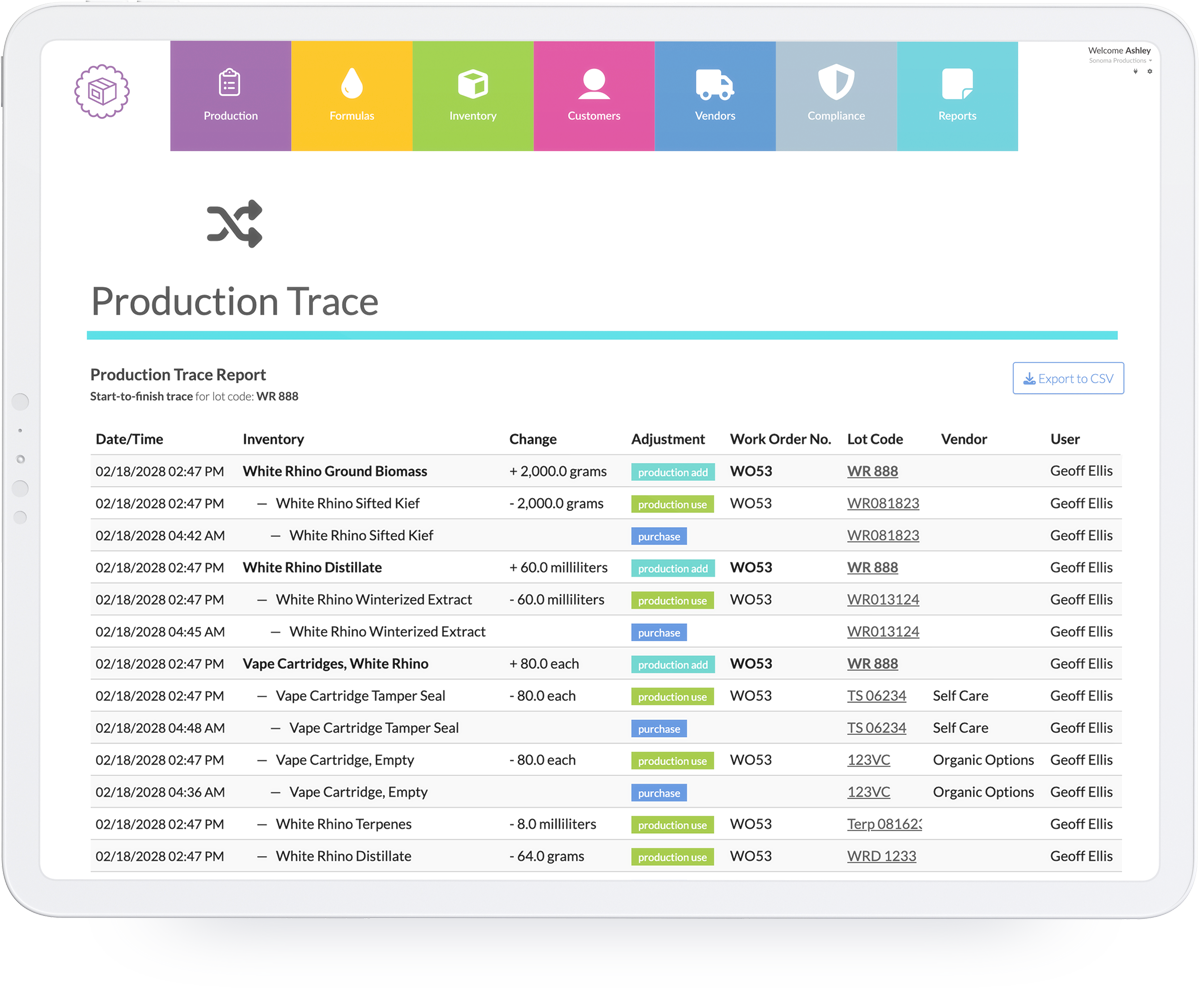
Features
Pros:
Cons:
Pricing: Contact Wherefour for more information on pricing and to receive your customized demo today!

BIOTRACKTHC
BioTrackTHC is a seed-to-sale cannabis ERP system with point-of-sale functionality, used across dispensaries, cultivators, and government entities. The software supports cannabis compliance, inventory control, and operational workflows, and integrates with Cannalytics for expanded reporting capabilities.
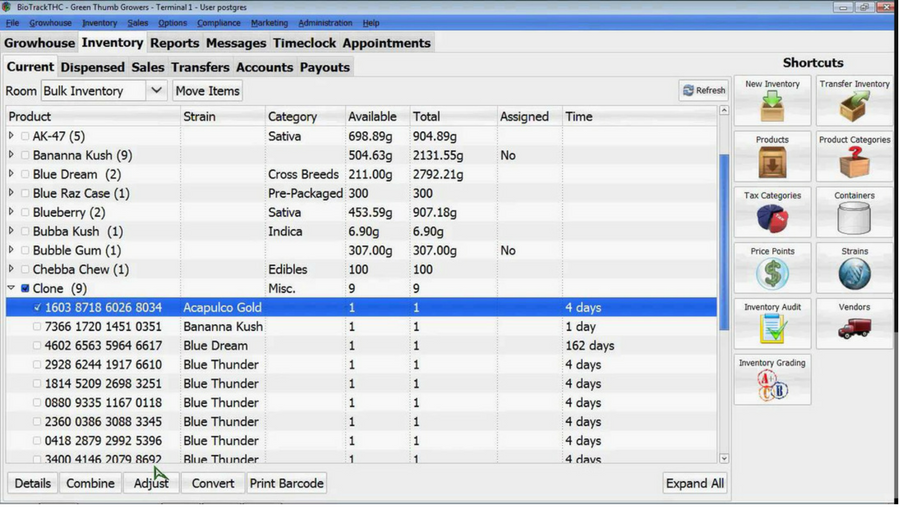
Features
Pros:
Cons:
Custom pricing based on business type, license class, and operational scope

CANIX
Canix is a cannabis-specific ERP platform designed for cultivators, manufacturers, and distributors operating in regulated markets. It integrates inventory management and production planning with financial reporting and compliance tracking.
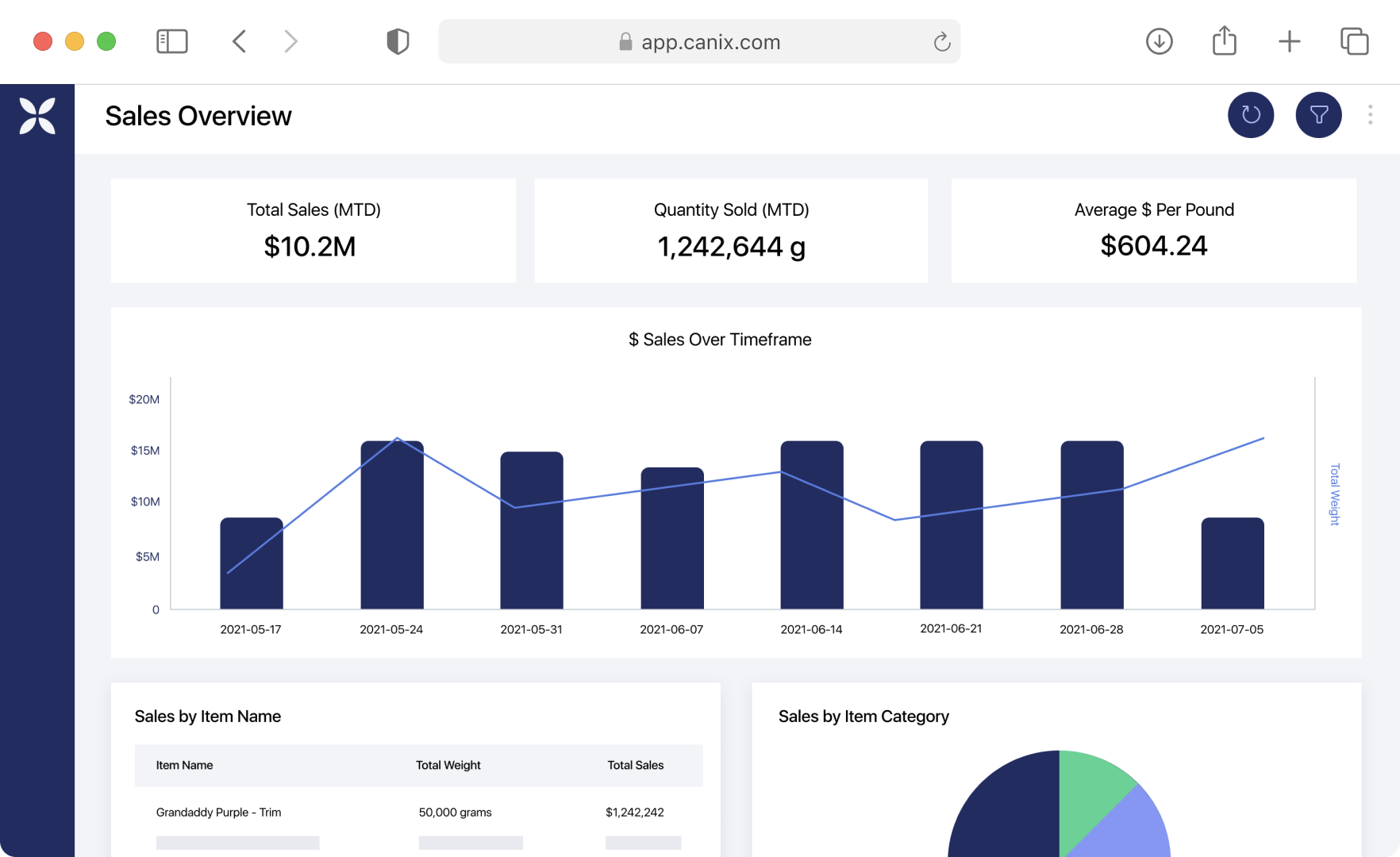
Features
Pros:
Cons:
Custom pricing based on business size, license type, and selected modules

FLOURISH
Flourish brings a brash tone of voice to its cannabis cultivation-to-retail ERP platform. Built by cannabis operators and supply chain engineers, it includes modules for compliance, inventory, manufacturing, and sales. It offers solutions for inventory, compliance, commerce, and analytics.
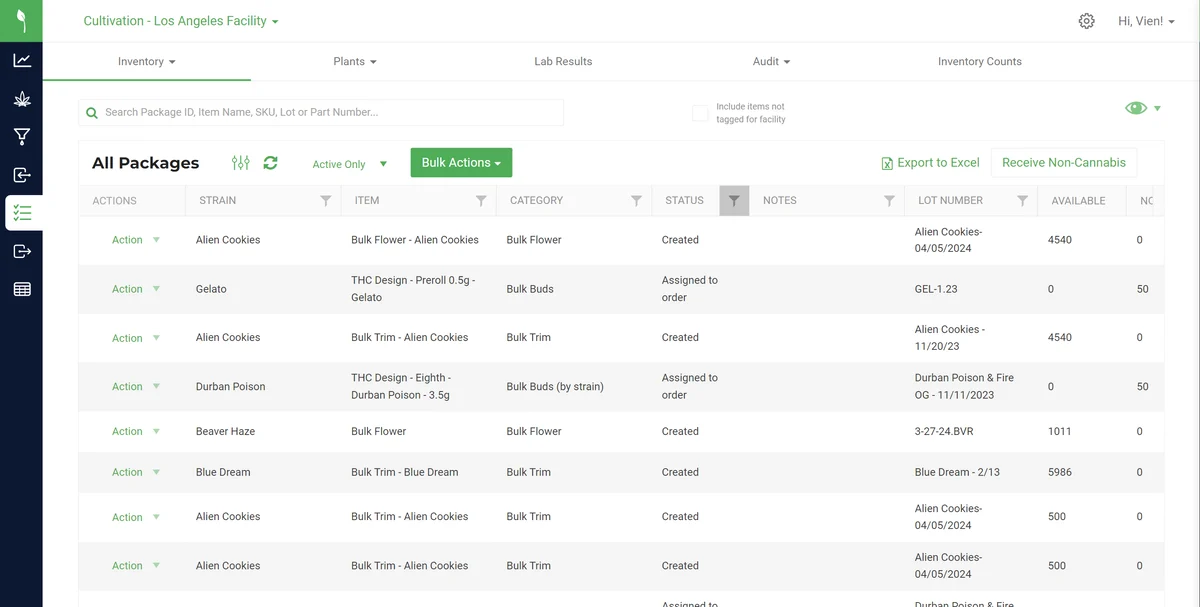
Features
Pros:
Cons:
Custom pricing based on business size, modules selected, and level of integration

INDICAONLINE
IndicaOnline is a cannabis-specific point of sale (POS) and delivery management platform for dispensaries and retail operators. It supports inventory control, compliance tracking, and customer management for single- and multi-location businesses.
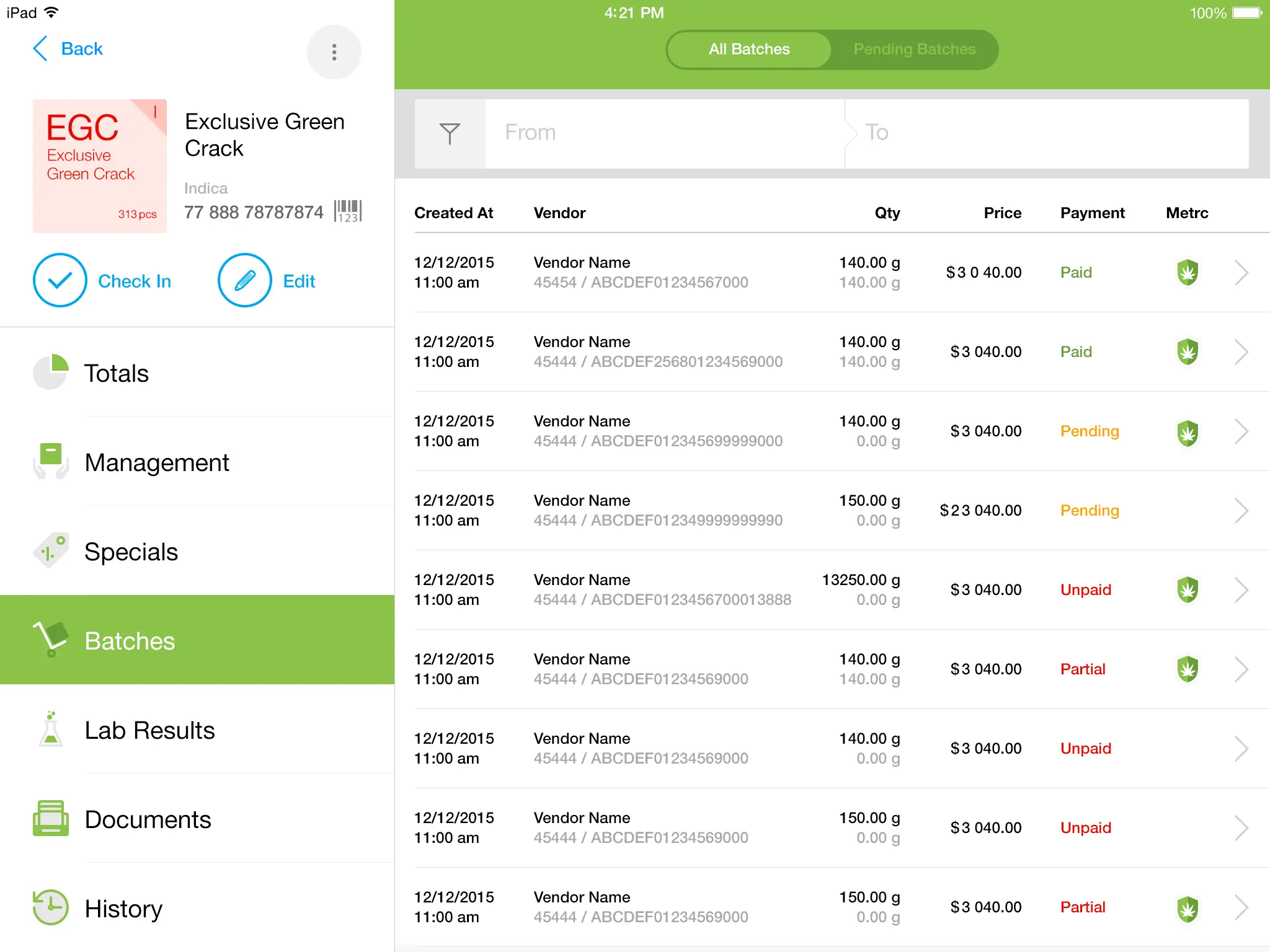
Features
Pros:
Cons:
Basic: $299/month
Elite: $499/month
Delivery: $499/month
Enterprise: Custom pricing available on request

ODOO
Odoo is a modular ERP system designed to unify key business operations, including inventory, sales, accounting, HR, and manufacturing, within a single interface. Though not cannabis-specific, companies can adapt it to support seed-to-sale workflows through custom configuration.
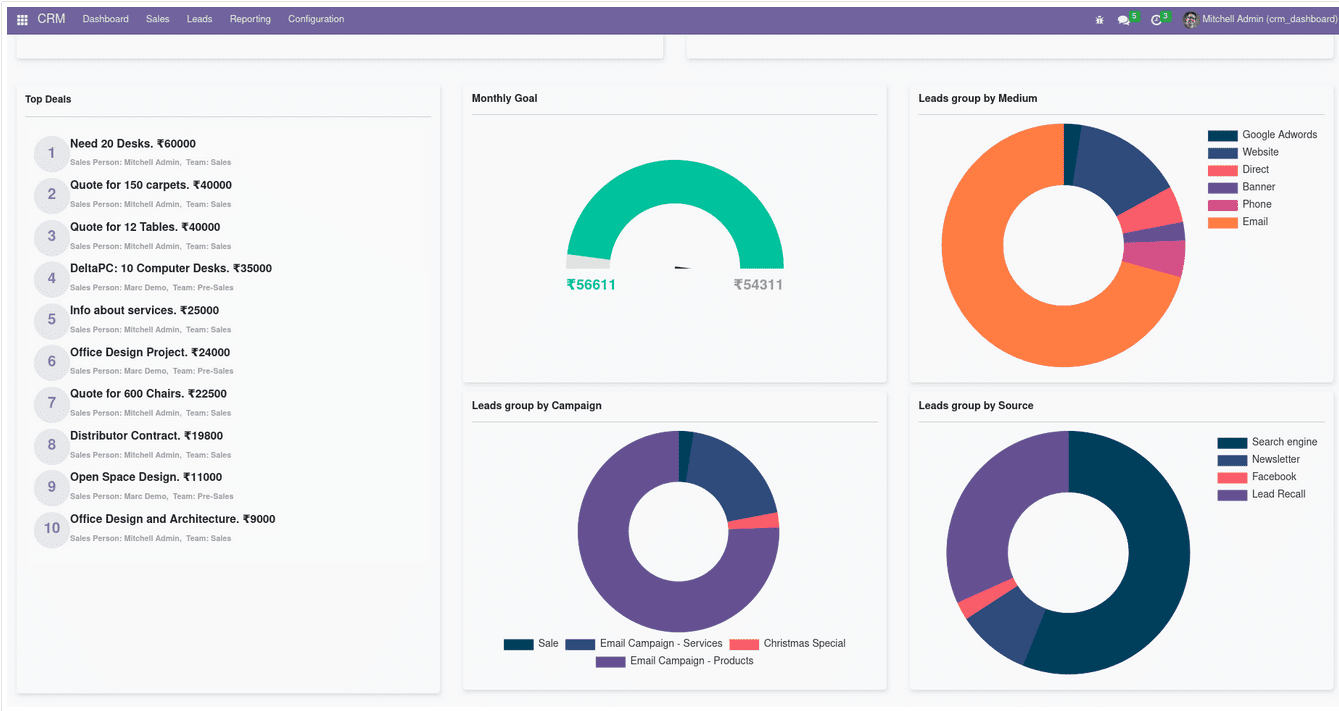
Features
Pros:
Cons:
One App: Free
Standard: $31.10/user/month
Custom: $46.80/user/month

PROTEUS 420
Proteus 420, as its name suggests, is a cannabis-specific ERP system offering seed-to-sale functionality for dispensaries, delivery services, cultivators, and manufacturers. It integrates POS, inventory management, accounting, and compliance into one system. The platform supports vertical integration as well as multi-location (MLO) and multi-state operations with tools for manufacturing, distribution, and real-time tracking.
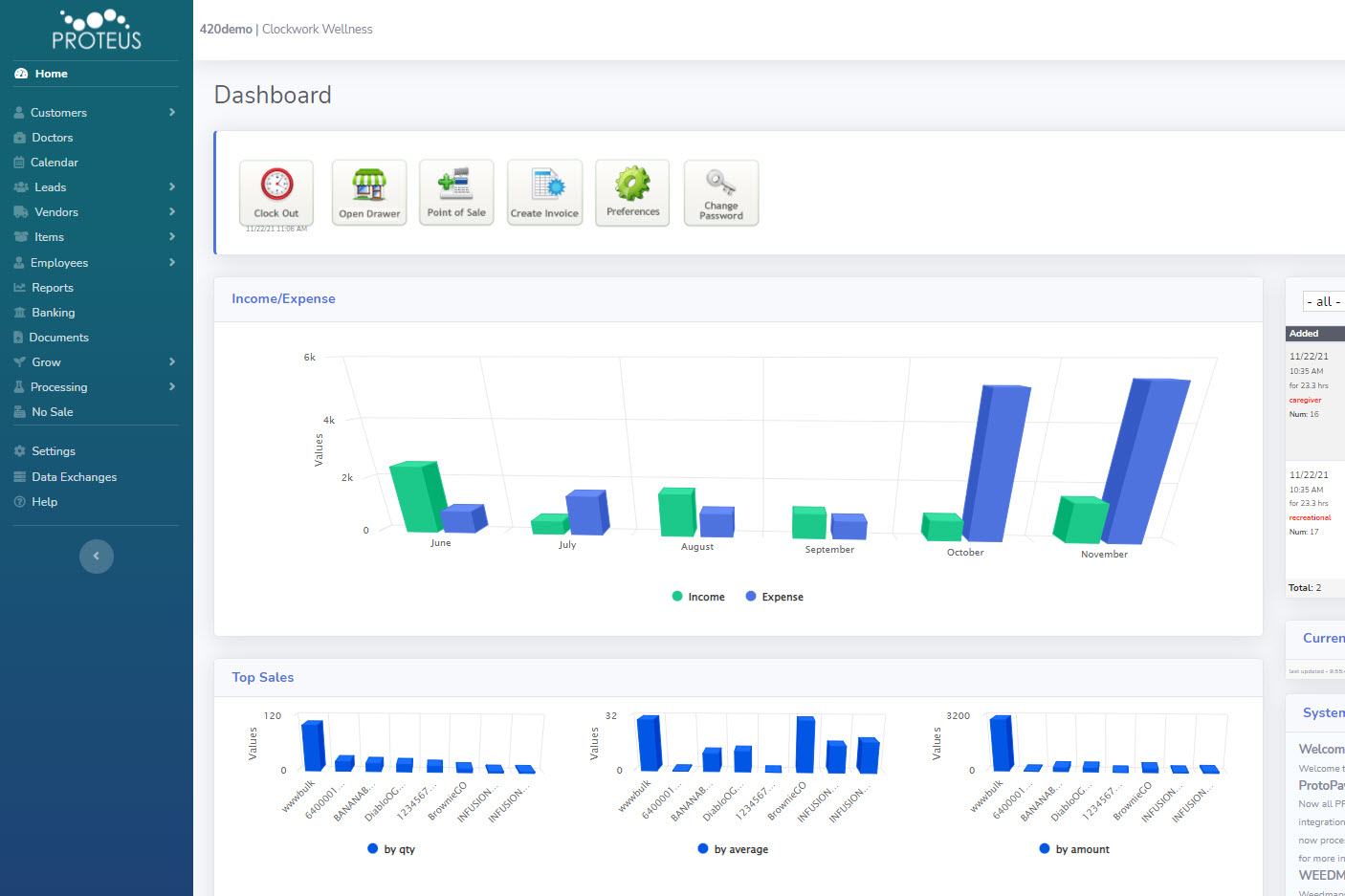
Features
Pros:
Cons:
Custom pricing based on license type, business model, and operational scope

ROYAL 4 WISECANNABIS
Royal 4’s WISECannabis is a cannabis ERP and warehouse management system (WMS) built on decades of experience in distribution and manufacturing. It offers a modular solution that spans cultivation, processing, retail, inventory, and compliance, with integrated support for Metrc, current good manufacturing practice (CGMP), and FDA standards. The platform supports lot/batch tracking, MRP, and cost calculations throughout the cannabis supply chain.
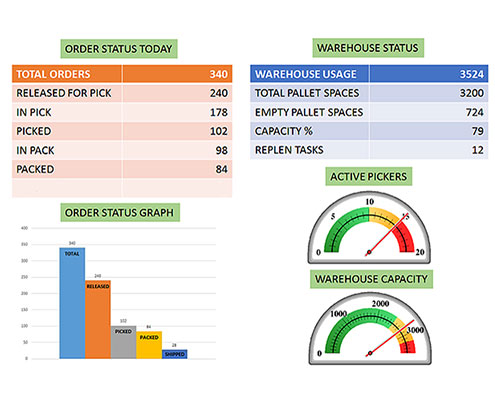
Features
Pros:
Cons:
Custom pricing based on operational scope, industry vertical, and deployment requirements

ACUMATICA
Acumatica is a cloud-based ERP platform that supports cannabis, hemp, and CBD businesses across cultivation, processing, manufacturing, and distribution. It includes modules for accounting, CRM, inventory, project management, and compliance tracking and is customizable via low-code tools. Cannabis-specific capabilities come through partner solutions such as MaxQ Cannabis and Quantum Leaf.
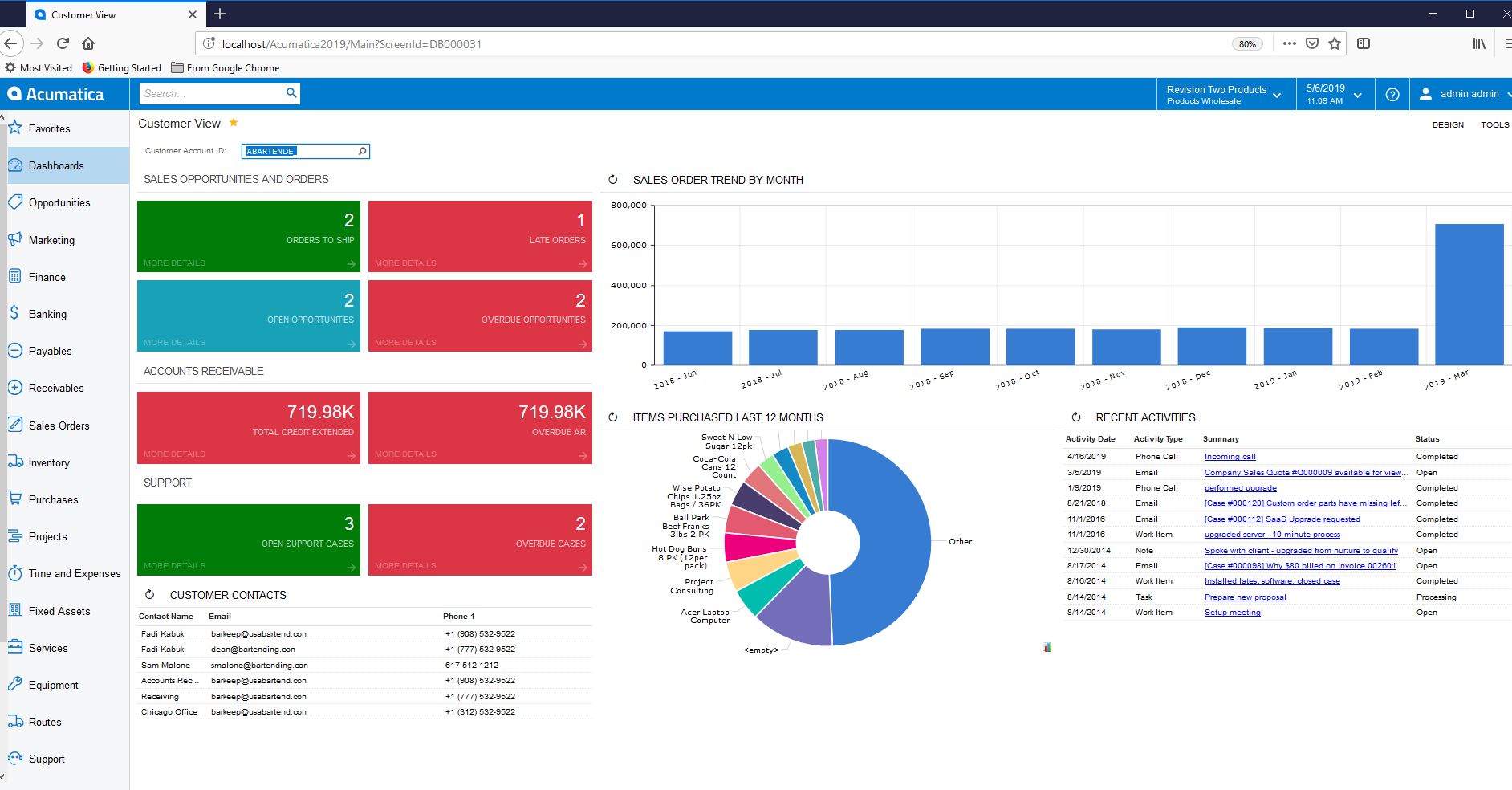
Features
Pros:
Cons:
No public pricing available

BACKBONE
Backbone is a cannabis-specific supply chain management platform designed to integrate operations, compliance, and financial workflows. Tailored for cannabis and hemp businesses, it connects inventory to accounting through real-time data and customizable automation.
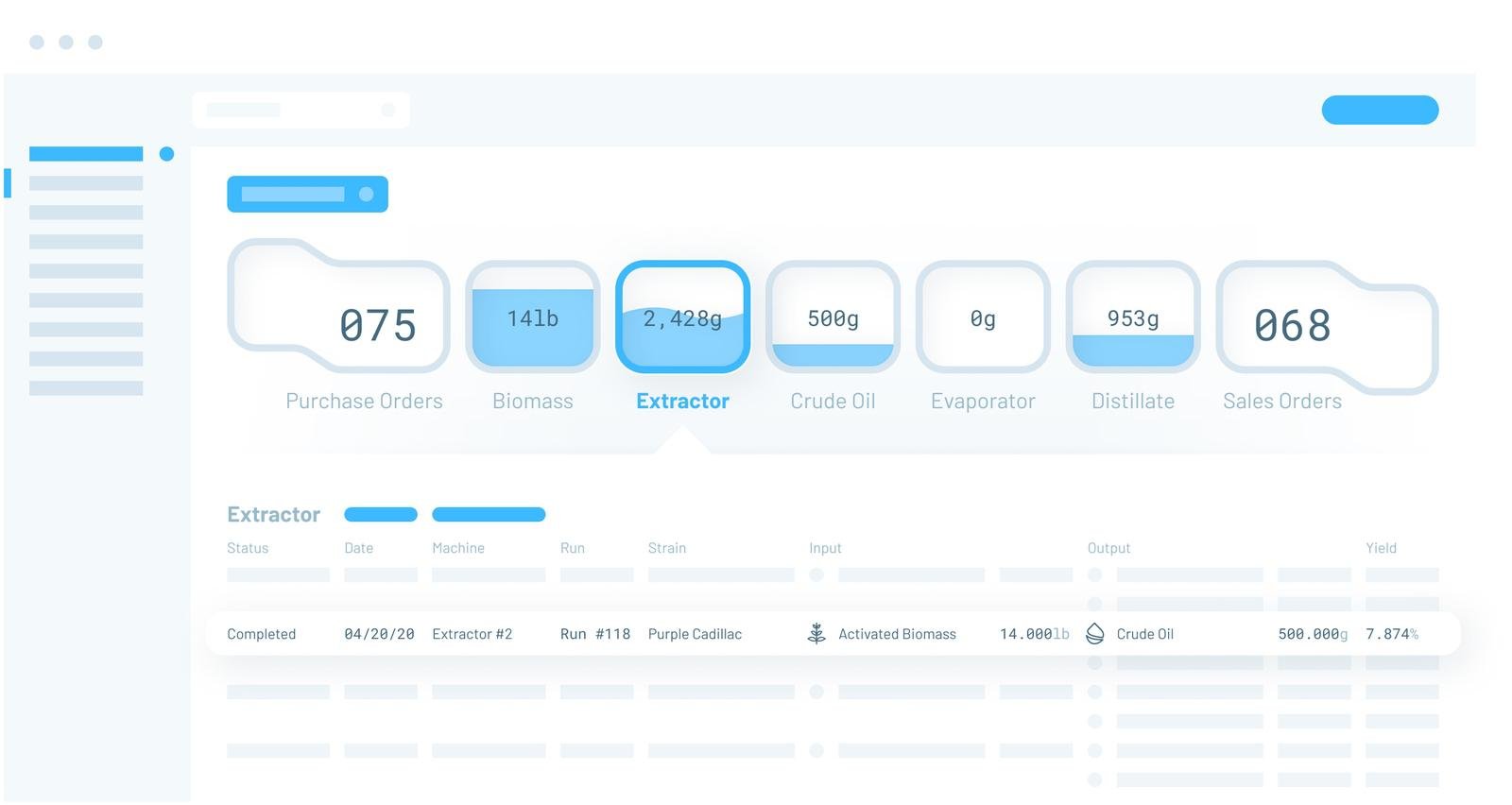
Features
Pros:
Cons:
Not publicly listed—custom pricing based on business needs and scale

365 CANNABIS
365 Cannabis is a cannabis-specific ERP built on Microsoft Dynamics, offering a vertically integrated solution for cultivators, processors, distributors, and retailers. It combines financial management, compliance, and operations into one system. The platform is designed to scale with multi-license and multi-location businesses across the cannabis supply chain.
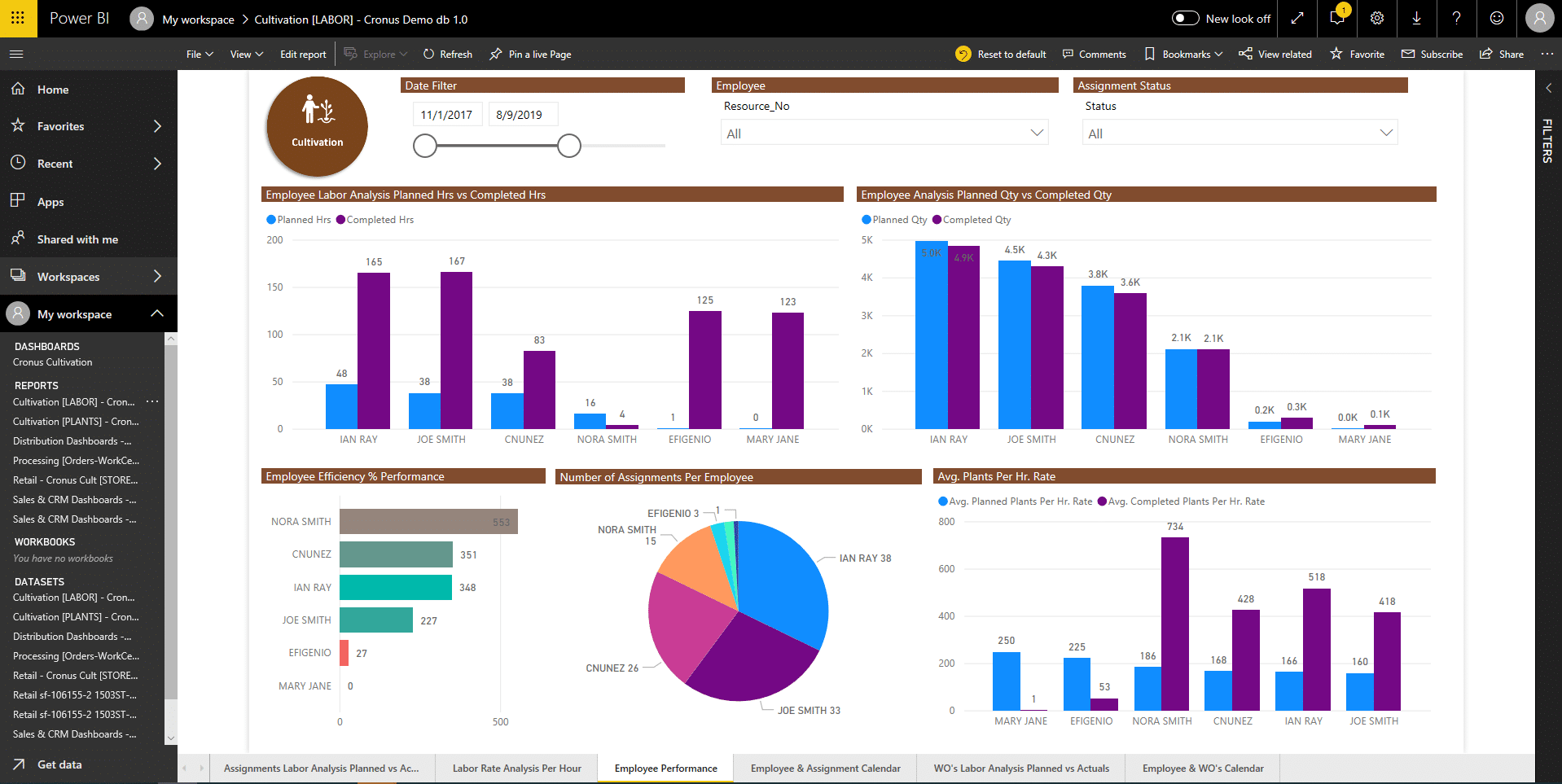
Features
Pros:
Cons:
Not publicly listed. Custom pricing based on business size, deployment scope, and licensing needs
Cannabis ERP Software Implementation Best Practices
Rolling out an ERP system is a major upgrade, so you need a thoughtful, well-executed implementation plan. Here’s how to set your team up for success:
Establish an internal project team: Start by assembling a dedicated cross-functional team to own the implementation. Include stakeholders from operations, compliance, finance, and IT—anyone who will have contact with the system. Assign a project lead to manage timelines, coordinate feedback, and serve as the go-to point of contact between your internal team and the ERP provider.
Define clear goals and KPIs: Before you begin configuration, identify what success looks like. Are you aiming for faster production cycles? Better inventory control? Fewer compliance errors? Define your key performance indicators (KPIs) up front so you can measure return on investment (ROI) and track improvements over time. These goals will also guide decisions around customization and integrations.
Get leadership buy-in: ERP implementation isn’t just a tech decision—it’s a strategic one. Make sure senior leadership is aligned on the goals, timeline, and budget. When the executive team supports the rollout, it’s easier to secure resources, drive adoption, and encourage team-wide engagement throughout the transition.
Create a detailed implementation plan: Break the project into phases with clear milestones and deliverables. Include time for training, system testing, and any required data cleanup. Cannabis operators should also factor in state-specific compliance needs and testing protocols. A strong implementation plan reduces surprises, minimizes downtime, and ensures your ERP system goes live smoothly and stays that way.
Make Cannabis Inventory Management a Breeze With Wherefour
In an industry where today’s compliance checklist might change overnight, cannabis businesses need more than just spreadsheets and sticky notes. The right ERP system brings clarity to chaos by connecting your production, inventory, sales, and compliance data into one smart, seamless workflow.
Wherefour helps cannabis operators ditch the guesswork and get real-time visibility from seed to sale. With built-in traceability, automated compliance tools, and powerful reporting features, it’s like having a full operations team in your back pocket—minus the extra overhead.
Whether you're managing multiple facilities or just getting your operation off the ground, Wherefour gives you the tools to grow with confidence and stay nimble.
Ready to see how Wherefour can simplify your day-to-day?
Schedule a custom demo and discover how effortless a cannabis ERP can be.
Cannabis ERP Software FAQs
What’s the difference between cannabis ERP software and seed-to-sale systems?
Seed-to-sale systems are designed primarily for compliance when tracking cannabis products from cultivation through sale to satisfy state-level regulations. Cannabis ERP software goes further. It integrates everything from inventory and production to sales, finance, and HR, giving you a full operational view beyond just compliance.
What’s the difference between cannabis ERP software and traditional ERP software?
Traditional ERP systems are designed for general manufacturing or retail environments. Cannabis ERP software is built with industry-specific needs in mind, like lot code traceability, automated COA bundling, compliance reporting, and integrations with platforms cannabis businesses actually use. It’s purpose-built for regulated products and patchwork laws.
Why do you need cannabis-specific ERP software?
Cannabis-specific ERP software is essential because cannabis isn’t like any other industry. Between strict tracking requirements, frequent audits, and evolving regulations, generic tools just don’t cut it. Cannabis-specific ERP software helps you stay compliant, avoid fines, and run your business efficiently without reinventing the wheel at every turn.
Is it easy to learn how to use cannabis ERP software?
With the right provider? Yes. Most cannabis ERP platforms are cloud-based and built with intuitive dashboards, mobile-friendly interfaces, and dedicated customer support. The best systems offer tailored onboarding and training to get your team up to speed quickly.
What’s the best ERP platform for cannabis?
The best ERP platform for cannabis is the one that aligns with your business size, compliance needs, and growth goals. Look for features like real-time inventory tracking, lot-level traceability, compliance automation, financial integrations, and robust technical support.
Wherefour is a great choice for companies of all sizes. With its flexibility, ease of use, cannabis-specific traceability, recall reporting, and B2B integrations, it helps you scale as your operation evolves.
Talk to our team to see how Wherefour can streamline your cannabis operations.

